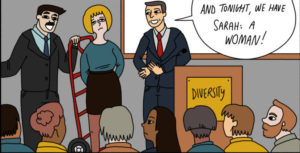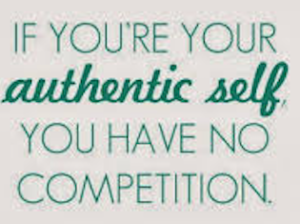 What is the quality that makes you feel like the “only one”? Common answers include race,
What is the quality that makes you feel like the “only one”? Common answers include race,
gender or sexual orientation. But people who come from different cultures also feel isolated: they have different worldview, or they hesitate to speak up because English is their second language and they lack the “correct” words. Or you may think that you are “the only one” because you are hiding your struggles with Asperger’s disorder, dyslexia, or a chronic disease, or you are married to an alcoholic, or you don’t want others to know you have overcome a speech impediment. Given the variety of qualities or characteristics that can at times make people feel like outsiders, you can appreciate that many people face this challenge.
Except for certain unusual and extremely talented exceptions, “outsiders” just don’t have the same opportunities to succeed for a number of reasons. First, there are the stereotypes: they “fear success” or “compete too aggressively,” or they are only good at certain traditional roles. They may carry the extra burden of being seen as “test cases” (sometimes even publicly identified as such) and subject to extra scrutiny. They are held out as examples (good or bad) of their group, and called upon to “represent” their group’s views as if all black/female/ wheelchair-bound people thought the same.
It is frustrating to be viewed through a lens that magnifies what is, after all, just one part of your total identity. No wonder many people in this situation choose one of these responses as a coping method and possible path to success:
- Overachievement—doing twice as much and being twice as good as members of the dominant group
- Blending in—trying to appear just like everyone else, essentially denying their own special characteristics
- Stepping out of the spotlight (and the competition)—taking a role behind the scenes or succeeding in safe and traditional areas
The myth of getting to the top promises that if you work hard and keep your nose clean you will be recognized and promoted on your merit. That’s great advice when you begin your career and your competency, credibility and results are on display. Don’t make th e mistake of holding fast to the ideal of the meritocracy. In a competitive field in which everyone is competent, characteristics such as organizational savvy and “fit” come to the fore. If you cling to expectations of a strict meritocracy, you will be disappointed.
e mistake of holding fast to the ideal of the meritocracy. In a competitive field in which everyone is competent, characteristics such as organizational savvy and “fit” come to the fore. If you cling to expectations of a strict meritocracy, you will be disappointed.
PS: What coping mechanism are you using. Warning– coping doesn’t work. Find and be your authentic self.
 From Chapter 6: How Can I Meet the Challenge of Being the Only One Like Me?
From Chapter 6: How Can I Meet the Challenge of Being the Only One Like Me?